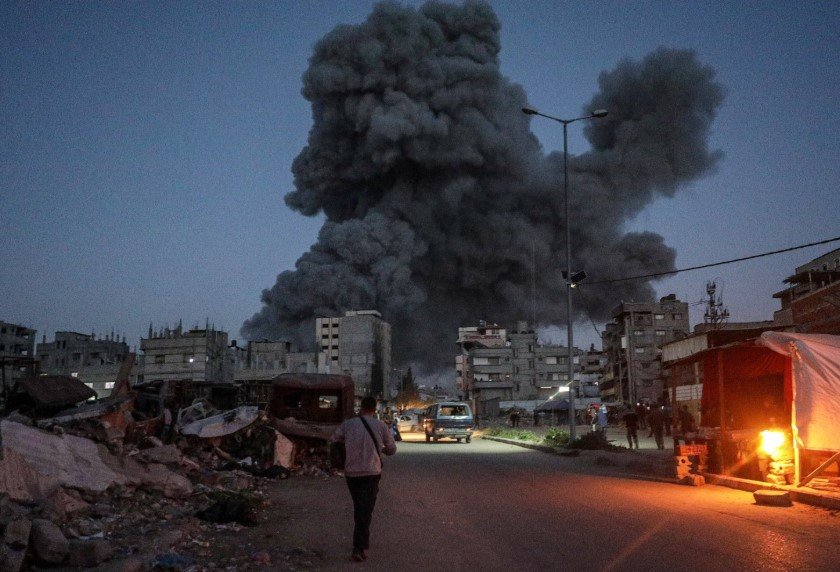Israel launched a wave of coordinated strikes on Yemen early Monday, targeting three Red Sea ports and a power facility, escalating tensions in a region already simmering with instability. The assault, confirmed by the Israeli military, marks the first direct hit on Yemeni soil in nearly a month.
It followed an incident off Hodeidah’s coast, where a ship was attacked and left adrift, its crew abandoning it as it took on water. That maritime attack appears to have tipped Israeli officials toward a military response aimed squarely at the Houthis.
A Flashpoint Revived in the Red Sea
The Israeli strikes hit four key sites: the ports of Hodeidah, Ras Isa, and Salif, and the Ras Qantib power plant. These aren’t minor spots on a map — they’re strategic pieces of infrastructure that serve both military and civilian ends in western Yemen.
One Israeli military spokesperson described the move as “necessary to prevent ongoing threats against Israeli shipping and territory.” Houthis, who control large swathes of western Yemen, have regularly targeted Israeli interests using missiles and drones since the Gaza war reignited regional friction in late 2023.
The overnight strikes were surgical but loud. Witnesses in Hodeidah said they heard multiple explosions around 2 a.m. local time. Video clips circulating on Telegram and X showed fires raging at port terminals and smoke clouds rising near the coastline. No casualty figures have been released by either side.

Houthis Blame U.S., Vow Retaliation
Houthi leadership was quick to respond — and they didn’t just single out Israel.
Within hours of the attack, Houthi military spokesperson Yahya Sare’e accused both Israel and the United States of jointly orchestrating the strikes. “This is a blatant act of aggression against Yemen,” Sare’e said in a televised statement from Sanaa, “and we hold the Zionist enemy and its American backers fully responsible.”
He also warned that retaliation would be “swift and painful.”
The group’s statement didn’t specify what form that would take, but given the Houthis’ history of using ballistic missiles, sea drones, and armed UAVs, few are taking the threat lightly.
There was no immediate response from Washington, though U.S. officials have repeatedly denied operational participation in Israeli airstrikes in Yemen, while supporting Israel’s right to defend itself.
Why These Ports Matter to Everyone
On paper, the targeted locations seem like Houthi strongholds. But it’s not that simple.
These ports — especially Hodeidah and Ras Isa — are critical for Yemen’s fragile economy and aid distribution. Hodeidah handles 70% of the country’s imports, including food and medicine. Salif is essential for grain and salt imports. Ras Isa is Yemen’s key oil export terminal, even if output has slowed due to the ongoing war.
Targeting them directly carries the risk of tipping Yemen further into humanitarian catastrophe.
Here’s a quick breakdown of what each location represents:
| Location | Importance | Potential Fallout |
|---|---|---|
| Hodeidah Port | Main import hub for aid and food | Could disrupt UN humanitarian efforts |
| Ras Isa Port | Key oil export facility | Might affect global oil insurance rates |
| Salif Port | Salt and grain processing | Could lead to local food price hikes |
| Ras Qantib | Major western power plant | Threatens blackout across provinces |
Aid agencies have already raised red flags. A UN OCHA staffer, speaking on background, said the strikes may lead to “delays and bottlenecks in critical relief operations.”
Maritime Mayhem Sets the Stage
The Israeli military cited Sunday’s attack on a commercial ship near Hodeidah as a catalyst. That vessel, whose name and flag remain undisclosed, was hit by what appeared to be an armed drone. The damage was severe enough that the crew abandoned ship, according to shipping trackers and maritime security sources.
-
No deaths were reported, but the incident added to a growing list of Red Sea flashpoints involving Iranian-aligned groups.
-
The United Kingdom Maritime Trade Operations (UKMTO) said they are still verifying who was behind the assault, though fingers immediately pointed toward Houthi forces.
-
Lloyd’s of London and other insurers have again raised premiums on routes passing near Yemen, further tightening trade through the Bab al-Mandeb strait.
This is not a small matter. About 10% of global seaborne trade passes through the Red Sea — and any disruption has a domino effect across supply chains from Rotterdam to Mumbai.
Timing Complicates Peace Talks
The airstrikes come at a delicate time for Yemen, too.
Just two weeks ago, UN Special Envoy Hans Grundberg resumed indirect negotiations between the Houthis and Saudi Arabia in Muscat. The talks aimed to build on a fragile ceasefire framework and potentially widen access to fuel imports and salaries for public workers.
Now, with Israeli bombs falling on Yemeni soil again, there’s concern that hardliners inside the Houthi camp may use the incident to derail negotiations.
An analyst with the International Crisis Group said Monday’s events “tilt the internal balance of power toward Houthi hawks, at the expense of those advocating international engagement.” His concern: if Houthi retaliation escalates, Saudi Arabia and even Egypt could be pulled into a broader conflict.
Risk of Escalation Across Borders
For now, Israel appears to be calibrating its response to avoid drawing in Iran directly. But every step closer to Houthi command centers raises that risk.
And Yemen isn’t acting in isolation. The Houthis are one spoke in a regional network of Iran-backed militias that include Hezbollah in Lebanon, Kata’ib Hezbollah in Iraq, and various armed factions in Syria.
With tensions already on edge after Iran’s mid-June naval drills off the Strait of Hormuz and last month’s Hezbollah-Israel border flareups, Monday’s airstrikes could be seen as another fuse lit.
Regional analysts say Israel may be betting that a short, targeted campaign could deter further Red Sea aggression. But as history shows, things rarely stay contained in this part of the world.
And with civilian infrastructure now in the crosshairs, even surgical strikes come at a high cost — politically and humanely.
